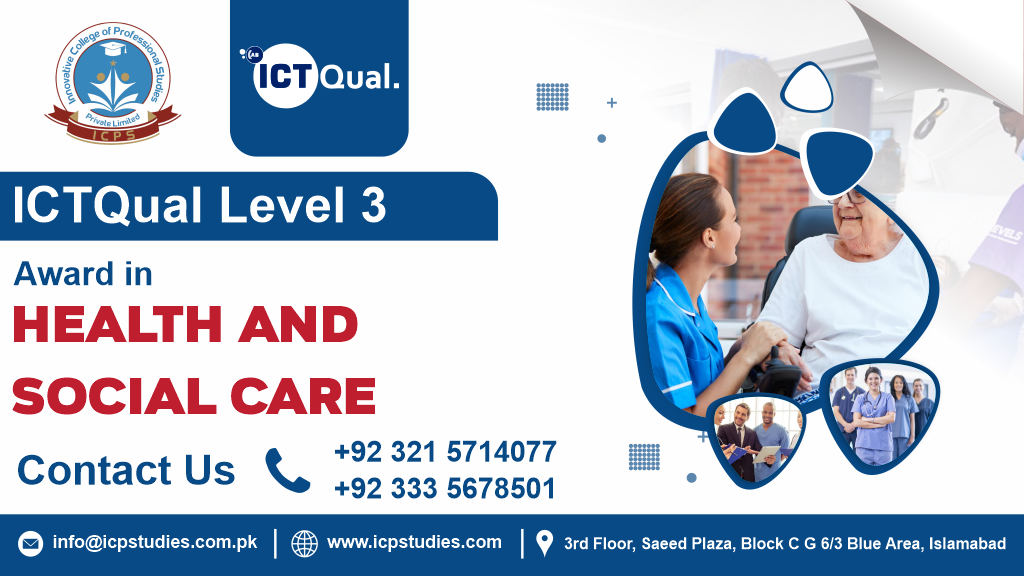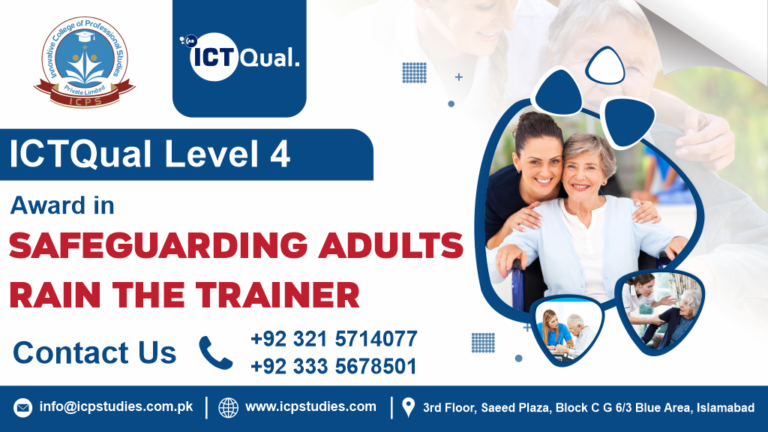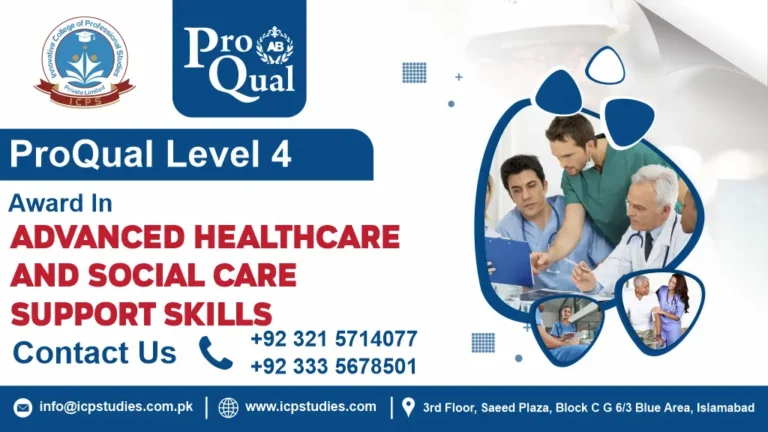In the ever-evolving field of health and social care, advancing your qualifications can open doors to new opportunities and enhance your ability to make a meaningful impact. The Level 3 Award in Health and Social Care is designed for individuals who are committed to deepening their expertise and taking on more specialized roles within the sector. Whether you’re looking to progress in your current career or seek new challenges, this qualification offers valuable skills and knowledge to help you achieve your goals.
The Level 3 Award in Health and Social Care is an advanced qualification that builds on the foundational knowledge gained from earlier levels of study, such as the Level 1 and Level 2 Awards. This course is aimed at individuals who have some experience in the field and are ready to develop their skills further in order to take on more complex responsibilities and leadership roles.
The Level 3 Award in Health and Social Care is an invaluable qualification for those looking to elevate their career in the health and social care sector. By providing advanced knowledge and skills in leadership, safeguarding, and complex care needs, this award equips professionals to take on more significant roles and make a greater impact. Whether you’re aiming to advance in your current role or seek new career opportunities, the Level 3 Award offers a pathway to success and professional growth.
All About ICTQual Level 3 Award in Health and Social Care
Course Overview
The Level 3 Award in Health and Social Care is an advanced qualification designed to build upon foundational knowledge and skills acquired in earlier stages of health and social care education. This award is intended for individuals who are already working in or have experience in the field and wish to develop their expertise further. It provides a deeper understanding of the complexities of care, leadership, and management within the sector.
The Level 3 Award in Health and Social Care is a vital qualification for those looking to advance their careers in the health and social care sector. It offers a comprehensive understanding of advanced care practices, leadership, and management, preparing individuals for more complex roles and responsibilities. By building on foundational knowledge and focusing on specialized areas, this award equips professionals to make a significant impact in their field and pursue further career opportunities.
Study Units
- Advanced Communication Skills in Health and Social Care
- Health Promotion and Public Health
- Care Planning and Coordination
- Managing Challenging Behaviors
- Supporting Individuals with Complex Needs
- Ethical and Legal Issues in Health and Social Care
- Health and Social Care Leadership and Management
- Research Methods in Health and Social Care
To enroll in the ICTQual Level 3 Award in Health and Social Care, participants typically need to meet the following requirements:
- Age Requirement: Participants should be at least 16 years old.
- Basic Literacy and Numeracy: A good understanding of English, along with basic literacy and numeracy skills, is essential for completing the course.
- Relevant Experience: While not mandatory, prior experience or exposure to health and social care settings is beneficial.
- Course Registration: Participants must register for the course through an accredited training provider.
- Payment: Course fees must be paid as required by the training provider.
- Commitment to Attend: Participants should be prepared to attend the full duration of the course and complete any required assessments to receive certification.
The ICTQual Level 3 Award in Health and Social Care is designed for:
- Aspiring Health and Social Care Professionals: Individuals looking to start or advance their careers in the health and social care sector.
- Current Care Workers: Those already working in health and social care who wish to enhance their skills and knowledge.
- Supervisors and Team Leaders: Individuals responsible for overseeing care teams who need a deeper understanding of care practices and management.
- Support Staff: Professionals providing assistance in healthcare settings who want to formalize their qualifications.
- Students: Individuals pursuing further education or training in health and social care.
- Anyone Seeking Career Advancement: Individuals looking to develop their skills for promotional opportunities within the sector.
Learning Outcome
1. Advanced Communication Skills in Health and Social Care
Learning Outcomes:
- Effective Communication Techniques: Learners will be able to demonstrate advanced communication techniques tailored to diverse audiences, including individuals with complex needs, families, and multidisciplinary teams.
- Non-Verbal Communication: Learners will be able to recognize and utilize non-verbal communication cues to enhance understanding and rapport with clients.
- Conflict Resolution: Learners will be able to apply strategies for resolving conflicts and managing difficult conversations effectively.
- Cultural Sensitivity: Learners will be able to adapt communication approaches to respect cultural and individual differences, ensuring inclusivity and empathy in interactions.
2. Health Promotion and Public Health
Learning Outcomes:
- Health Promotion Strategies: Learners will be able to design and implement effective health promotion strategies aimed at improving public health outcomes.
- Understanding Public Health Issues: Learners will be able to analyze current public health issues and trends, including the impact of lifestyle factors on health.
- Community Engagement: Learners will be able to develop and deliver community-based health education programs that address specific health needs.
- Evaluating Health Interventions: Learners will be able to assess the effectiveness of health promotion interventions and make evidence-based recommendations for improvement.
3. Care Planning and Coordination
Learning Outcomes:
- Developing Care Plans: Learners will be able to create comprehensive and person-centered care plans based on individual assessments and needs.
- Coordinating Care: Learners will be able to coordinate care effectively across different services and professionals, ensuring seamless and holistic support for individuals.
- Monitoring and Reviewing: Learners will be able to monitor and review care plans regularly, making necessary adjustments to meet changing needs and improve outcomes.
- Engaging Stakeholders: Learners will be able to engage and collaborate with individuals, families, and care teams to ensure that care plans are tailored and responsive.
4. Managing Challenging Behaviors
Learning Outcomes:
- Identifying Challenging Behaviors: Learners will be able to identify and understand the underlying causes of challenging behaviors in various care settings.
- Behavior Management Techniques: Learners will be able to implement effective behavior management techniques and strategies to address and mitigate challenging behaviors.
- Developing Intervention Plans: Learners will be able to develop and apply individualized intervention plans that promote positive behavior and support emotional well-being.
- Supporting Staff: Learners will be able to provide guidance and support to colleagues in managing challenging behaviors, fostering a supportive and effective care environment.
5. Supporting Individuals with Complex Needs
Learning Outcomes:
- Understanding Complex Needs: Learners will be able to describe the complexities associated with supporting individuals who have multiple or severe needs, including physical, mental, or sensory impairments.
- Person-Centered Approaches: Learners will be able to apply person-centered approaches to develop and deliver tailored support that meets the unique needs of individuals.
- Collaborative Support: Learners will be able to work collaboratively with other professionals and agencies to provide holistic support and address multifaceted needs.
- Evaluating Care: Learners will be able to assess the effectiveness of support provided to individuals with complex needs and make necessary adjustments to improve their quality of life.
6. Ethical and Legal Issues in Health and Social Care
Learning Outcomes:
- Understanding Ethical Principles: Learners will be able to explain key ethical principles and how they apply to practice in health and social care settings.
- Navigating Legal Frameworks: Learners will be able to navigate relevant legal frameworks, including legislation and regulations affecting health and social care practice.
- Decision-Making: Learners will be able to make informed ethical and legal decisions in complex situations, balancing individual rights and professional responsibilities.
- Confidentiality and Consent: Learners will be able to ensure confidentiality and obtain informed consent, respecting the rights and autonomy of individuals receiving care.
7. Health and Social Care Leadership and Management
Learning Outcomes:
- Leadership Skills: Learners will be able to demonstrate effective leadership skills, including team motivation, strategic planning, and decision-making.
- Management Techniques: Learners will be able to apply management techniques to oversee care delivery, manage resources, and ensure quality standards are met.
- Change Management: Learners will be able to lead and manage change within care settings, addressing challenges and implementing improvements.
- Performance Evaluation: Learners will be able to evaluate staff performance and provide constructive feedback to support professional development and enhance service delivery.
8. Research Methods in Health and Social Care
Learning Outcomes:
- Understanding Research Methods: Learners will be able to explain various research methods used in health and social care, including qualitative and quantitative approaches.
- Conducting Research: Learners will be able to design and conduct research projects, including formulating research questions, collecting and analyzing data, and interpreting findings.
- Ethical Considerations: Learners will be able to identify and address ethical considerations in research, including informed consent and data protection.
- Applying Research: Learners will be able to apply research findings to practice, contributing to evidence-based improvements in care and policy development.
These learning outcomes are designed to equip learners with advanced skills and knowledge necessary for higher-level roles and responsibilities in the health and social care sector. They ensure that learners are prepared to handle complex care scenarios, lead teams effectively, and contribute to the ongoing development and improvement of care practices.
FAQs about ICTQual Level 3 Award in Health and Social Care







